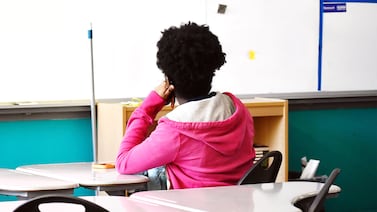Detroit Public Schools Community District students will see greater investments in literacy education thanks to a three-year plan to spend $94.4 million in “right to read” lawsuit settlement money.
DPSCD Board of Education officials unanimously approved the plan Tuesday night.
The board’s approval means struggling students in the district will receive more individualized help through reduced class sizes, and more literacy teachers and academic interventionists.
Seven Detroit public school students filed the ‘right to read’ lawsuit against the state in 2016. Students argued that Michigan emergency managers who controlled the district between 2009 and 2015 created conditions unfit for obtaining a quality education. Large classroom sizes, inadequate literacy intervention programs, and a lack of education resources for English language learners were among the many issues the lawsuit cited. Building maintenance issues exacerbated these problems, creating an environment that was not conducive to learning.
The lawsuit, originally called Gary B. v. Snyder during former Gov. Rick Snyder’s term, was later called Gary B. v. Whitmer to reflect Gov. Gretchen Whitmer’s administration. Whitmer and the seven plaintiffs reached the $94.4 million settlement in 2020 amid pressure from protestors and a federal Sixth Court of Appeals ruling that literacy is a protected right in the U.S. Constitution. The settlement meant plaintiffs dropped their bid to establish this constitutional right.
The settlement confirmed student claims that Michigan’s emergency managers created conditions that made it harder for students to learn to read. It also established two task forces to make policy recommendations to the school board and governor. One group, the Literacy Equity Task Force, discussed how DPSCD should allocate the settlement money at its first meeting last August.
It took three years for the district to receive the $94.4 million and almost another year for school officials to decide how to use the funds with guidance from the task force.
The three-year plan seeks to address disparities such as literacy rates which indicate that students are not getting the foundational literacy skills they need. In the spring of 2023, 24.7% of students read three levels below their grade while only 13.5% of students could read at grade level. The plan includes enhanced literacy intervention in core and small group instruction, increased support for immigrant students, and resources for students to expand their learning at home.
Here are some of the key investment areas:
- Increase the ratio of academic interventionists for K-4 students.
- Bonuses for teachers in challenging positions.
- Hire more teachers to reduce K-3 class sizes.
- Supply supplemental reading programs with technology and new materials.
- Expand City Year, an AmeriCorps program that sends success coaches into schools.
- Hire one multilingual academic interventionist for every 42 students to support immigrant students and English language learners.
- Increase available reading materials for children to use at home.
Auditing firm Plante Moran will generate a report of literary performance and the use of settlement funds each year for the board’s review. The audits will help the DPSCD board assess what’s working and what needs to change.
During an April district community meeting, Superintendent Nikolai Vitti also pointed out a caveat with the funding: “it’s one-time money,” he said. The district hopes to create long-term initiatives that can be funded in other ways once the lawsuit money ends.
Alex Klaus is a summer intern for Chalkbeat Detroit. You can reach her at aklaus@chalkbeat.org.







